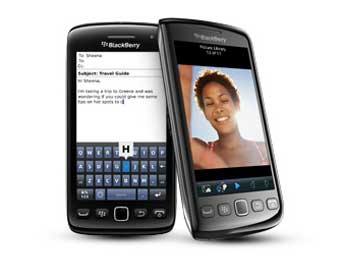Canadian BlackBerry maker RIM has a lot to prove wtih the launch of its Blackberry 10 (BB10) operating system later today. The handset vendor’s struggles have been much publicised—after posting disappointing financial results throughout last year it watched its share of the global smartphone market drop to just 4.1 per cent in 2012, according to data from Informa’s Intelligence Centre. In 2010 it had been more than 17 per cent.
January 30, 2013

Canadian BlackBerry maker RIM has a lot to prove wtih the launch of its Blackberry 10 (BB10) operating system later today. The handset vendor’s struggles have been much publicised—after posting disappointing financial results throughout last year it watched its share of the global smartphone market drop to just 4.1 per cent in 2012, according to data from Informa’s Intelligence Centre. In 2010 it had been more than 17 per cent.
Here Telecoms.com investigates what the company will be bringing to the table as it attempts to reverse its decline.
Since his appointment as CEO of the firm in January 2012, Thorsten Heins has spoken often about the impact that BB10 will have on RIM’s performance. He has said that the platform will be future proof for the next ten years—and there will need to be evidence of this at the unveiling if it is to generate any sort of enthusiasm from industry observers.
As Colin Cieszynski, market analyst at financial derivatives dealer CMC Markets Canada puts it: “Having become a fallen star in the eyes of the street, RIM needs a big hit to turn this tale from one of woe to one of redemption.”
The landscape has changed drastically since RIM established dominance in the enterprise device market. Today smartphones are consumer rather than enterprise purchases, and those consumers are overwhelmingly opting for Android and iOS handsets—more than 92 per cent of smarpthone sales in 4Q12 were accounted for by these two operating systems, according to Strategy Analytics.
Jan Dawson, chief telecoms analyst at Ovum, says this could represent a pitfall for RIM as it is still very much focused on the needs of the enterprise.
“The points of differentiation RIM has focused on in teasers for the new platform confirm this – better multitasking, productivity, email, contacts and calendar applications and so on, rather than a better gaming, content consumption or social networking experience,” he says.
It is Ovum’s view, he says, that RIM’s intention for BlackBerry 10 is that it be “the best BlackBerry for BlackBerry users” rather than something that will necessarily win converts from other platforms.
Not everyone agrees though. Malik Saadi, principal analyst at Informa Telecoms & Media, has had a look at prototypes of the BlackBerry Z10, which will launched today and targeted squarely at the high end smartphone market, and is impressed by what he sees. “Certainly, RIM should not be shy in comparing this device to Apple’s iPhone or Samsung’s S3,” he says.
He adds that the previous OS, BlackBerry 7, lacked music and video hubs, which effectively disqualified it as a contender in the consumer smartphone market, but such hubs have now been integrated into BB10.
Nonetheless, Saadi is not expecting fireworks any time soon. He cautioned that even the iPhone sold in modest quantities when it was first launched in 2007, as did the HTC Dream (or T-Mobile G1) – the first ever Android handset.
“This is a completely new platform, with a unique user experience, which requires customers to accept and adapt to it,” he says. “For RIM to sell between one or two million units of the Z10 in the first quarter of its launch would be acceptable; three to four million would be very good; anything higher would be exceptional. But anything less than one million would be deemed as totally unacceptable by shareholders.”
Ovum’s Dawson notes that at its peak, RIM shipped between 12 and 15 million BlackBerry devices per quarter, but believes there is no way it can hit this number on a sustainable basis once the BB10 launch filters through.
“Though the new platform should have significant appeal to existing users, we don’t expect it to win significant numbers of converts from other platforms,” he says. “There is little in the new platform that suggests it will have the compelling apps, content stores, or the broader ecosystem that consumers have come to expect in a competitive smartphone platform.”
Reinstating itself as a serious contender in the premium smartphone market is not the only challenge facing RIM. The company’s form in emerging markets has been comparatively strong and, with so much time and effort invested into the BB10 platform, RIM will need to be careful that it does not jeopardise the stronghold that it has in markets such as Southeast Asia and Central Africa.
“In emerging markets, BlackBerry devices have become a middle-class status symbol as they once were in mature markets,” says Dawson. “But these devices are low-priced and based on BB10’s predecessor BB7, which is destined for the scrap heap in the medium term. As developers shift their focus to BB10, it will be harder and harder for RIM to maintain the appeal of the older platform in these markets, especially since it is unlikely to release new hardware running BB7.”
Saadi agrees and warned that unless RIM continues to develop low-end BlackBerry 7 devices for emerging markets, it could lose the little clout it still has.
“BB10 does not address emerging markets, and it is likely to be 2014 before RIM can scale down the platform enough to launch low end devices running on it. The company needs to address this issue quickly, otherwise it could lose out to the likes of Nokia, ZTE and Huawei.”
About the Author(s)
You May Also Like








.png?width=300&auto=webp&quality=80&disable=upscale)


_1.jpg?width=300&auto=webp&quality=80&disable=upscale)


.png?width=800&auto=webp&quality=80&disable=upscale)